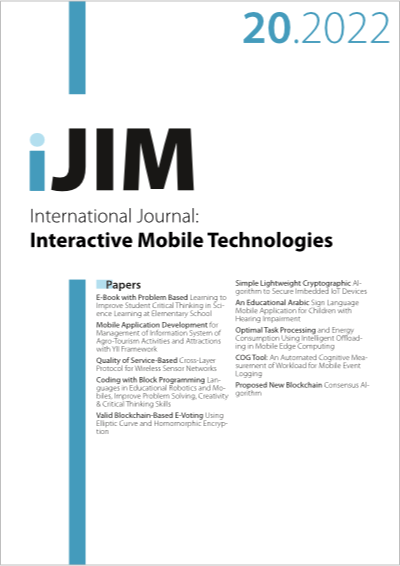Simple Lightweight Cryptographic Algorithm to Secure Imbedded IoT Devices
DOI:
https://doi.org/10.3991/ijim.v16i20.34505Keywords:
IoT, Information Security, Block Cipher, LFSR, Lightweight Cryptography, Feistel StructureAbstract
The internet of things (IoT) revolution has been sparked by the exponential increase in connected devices caused by recent advances in wireless technology. These embedded devices gather, analyze, and send vast data via the network. Data transmission security is a primary problem in IoT networks. Several lightweight encryption/decryption algorithms have been developed for such resource-constraint devices. One of most effective and fast lightweight encryption algorithms for IoT applications is the Tiny Encryption Algorithm (TEA). TEA has few lines source of codes to implement and based on Feistel structure to provide cryptographic primitive confusion and diffusion features in order to hide statistical aspects of plaintext. However, it is vulnerable to assaults using equivalent and related key attacks. This study suggested modifying TEA by employing a new proposed generating keys function using two Linear Feedback Shift Registers (LFSRs) as a combination to address the security flaw caused by utilizing different keys for each round function. The key sensitivity, Avalanche effect, and a completeness test were used to evaluate its security performance. The key sensitivity of the proposed modified TEA outperforms original TEA by 50.18 % to 44.88 %. The modified TEA avalanche effect outperforms TEA by 52.57 % to 47.69 %, and its completeness test outperforms TEA by 51.75 % to 48.36 %. Experimental results indicates that, the encryption performance of proposed modified TEA is better than original TEA.
Downloads
Published
How to Cite
Issue
Section
License
Copyright (c) 2022 Hakeem Imad Mhaibes

This work is licensed under a Creative Commons Attribution 4.0 International License.



